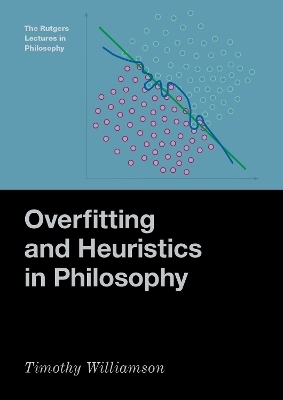
Overfitting and Heuristics in Philosophy
Oxford University Press Inc (Verlag)
978-0-19-777921-7 (ISBN)
Timothy Williamson is Wykeham Professor of Logic Emeritus at the University of Oxford and Whitney Griswold Visiting Professor at Yale University. He has also taught at MIT, Princeton, Edinburgh, Trinity College Dublin, Chinese University of Hong Kong, and elsewhere. He works on logic, philosophy of language, epistemology, metaphysics, and metaphilosophy. His books include Doing Philosophy, Tetralogue, Knowledge and its Limits, Vagueness, The Philosophy of Philosophy, and Suppose and Tell. He is a Fellow of the British Academy, Foreign Honorary Member of the American Academy of Arts and Sciences, and Member of the Academia Europaea.
Preface
Chapter 1. Heuristics
1.1 Counterexamples
1.2 What are heuristics?
1.3 The persistence heuristic
1.4 The suppositional heuristic for conditionals
1.5 Disquotation and heuristics for belief ascription
1.6 The weighing heuristic for reasons
1.7 Implications for philosophical methodology
Chapter 2. Overfitting and Degrees of Freedom
2.1 Error-fragility
2.2 Data fitting
2.3 Overfitting in philosophical analysis
2.4 Overfitting in semantics
2.5 Overfitting in logic
2.6 Overfitting in philosophical model-building
2.7 Summing up
Chapter 3. Case Study: Hyperintensionalism
3.1 Two revolutions?
3.2 Extensional, intensional, hyperintensional
3.3 Hyperintensional semantics: impossible worlds
3.4 Hyperintensional semantics: truthmakers
3.5 Hyperintensional semantics: Russellian propositions
3.6 The 'why?' heuristic
Chapter 4. Frege puzzles
4.1 Representational hyperintensionality
4.2 The Fregean consensus
4.3 The failure of the Fregean consensus
4.4 Frege puzzles and synonymy
4.5 Frege puzzles from the inside
4.6 The necessary a posteriori and the contingent a priori
4.7 Heuristics for belief ascription
4.8 Heuristics for knowledge ascription
4.9 Evidence
4.10 Probability
4.11 Epistemic and doxastic logic
4.12 Drawing the threads together
Chapter 5. Intensional metametaphysics
5.1 Semantic challenges to metaphysics
5.2 The coarse-grained challenge to metaphysics
5.3 Generalizing the problem
5.4 The metalinguistic strategy
5.5 Reconceiving the problem
5.6 In brief
Bibliography
Index
| Erscheinungsdatum | 22.08.2024 |
|---|---|
| Reihe/Serie | The Rutgers Lectures in Philosophy |
| Verlagsort | New York |
| Sprache | englisch |
| Maße | 137 x 198 mm |
| Gewicht | 431 g |
| Themenwelt | Geisteswissenschaften ► Philosophie ► Erkenntnistheorie / Wissenschaftstheorie |
| Geisteswissenschaften ► Philosophie ► Metaphysik / Ontologie | |
| ISBN-10 | 0-19-777921-2 / 0197779212 |
| ISBN-13 | 978-0-19-777921-7 / 9780197779217 |
| Zustand | Neuware |
| Haben Sie eine Frage zum Produkt? |
aus dem Bereich


![Was heißt Denken?. Vorlesung Wintersemester 1951/52. [Was bedeutet das alles?] - Martin Heidegger](/media/113619842)